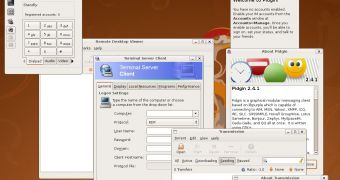Dear Ubuntu 8.04 users, the time has come to say goodbye to the Hardy Heron release of the popular Ubuntu operating system. One month from today, on May 12th, it reaches end of life (EOL).
Almost 36 months ago, on the 28th of April, 2008, Canonical was proud to announce the release of the Ubuntu 8.04 LTS operating system, dubbed Hardy Heron.
Ubuntu 8.04 LTS was Canonical's second LTS (Long Term Support) release and it introduced features such as GNOME 2.22.1, Linux kernel 2.6.24.3 (with dynticks support and a new process scheduler), X.Org 7.3, PulseAudio 0.9.10, iSCSI support, PolicyKit 0.7, ActiveDirectory integration and KVM integration.
We are sorry to announce today that starting with May 12th, 2011, Canonical will stop "feeding" the Ubuntu 8.04 LTS (Hardy Heron) Desktop edition with security or critical fixes, and software updates. The Server edition of Ubuntu 8.04 LTS (Hardy Heron) will continue to be actively supported with bug fixes and security updates.
Therefore, we strongly recommend upgrading your Ubuntu 8.04 LTS workstations to the current version, Ubuntu 10.10 (Maverick Meerkat), or wait three more weeks for the brand-new and amazing Ubuntu 11.04 (Natty Narwhal), due for release on April 28th, 2011.
"The supported upgrade path from Ubuntu 8.04 Desktop is via Ubuntu 10.04 Desktop. Instructions and caveats for the upgrade may be found at https://help.ubuntu.com/community/LucidUpgrades. Ubuntu 8.04 Server continues to be actively supported with security updates and select high-impact bug fixes." - said Kate Stewart in the announcement.
On April 28th, Ubuntu 11.04 (Natty Narwhal) will become the 14th release of the Ubuntu operating system. Don't forget to visit our website this Thursday, April 14th, for an in-depth article on the Ubuntu 11.04 (Natty Narwhal) Beta 2 release, where we will unveil more of Natty's new features!
About Ubuntu
Ubuntu is a Linux distribution for your desktop or server, with a fast and easy install, regular releases, a tight selection of excellent packages installed by default, every other package you can imagine available from the network, and professional technical support from Canonical Ltd and hundreds of other companies around the world.

 14 DAY TRIAL //
14 DAY TRIAL //